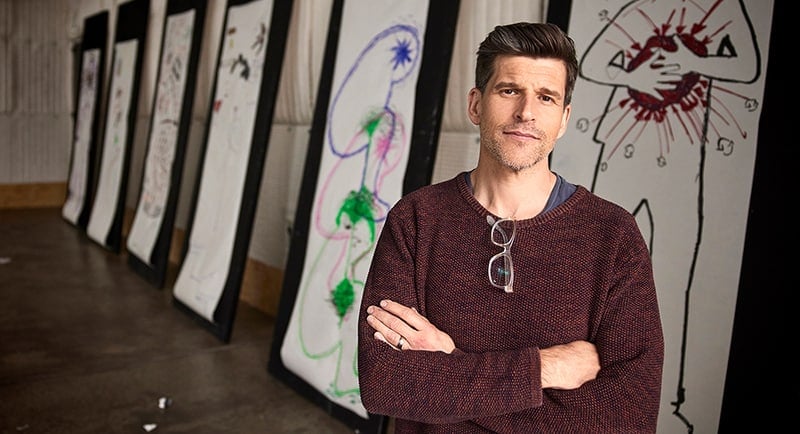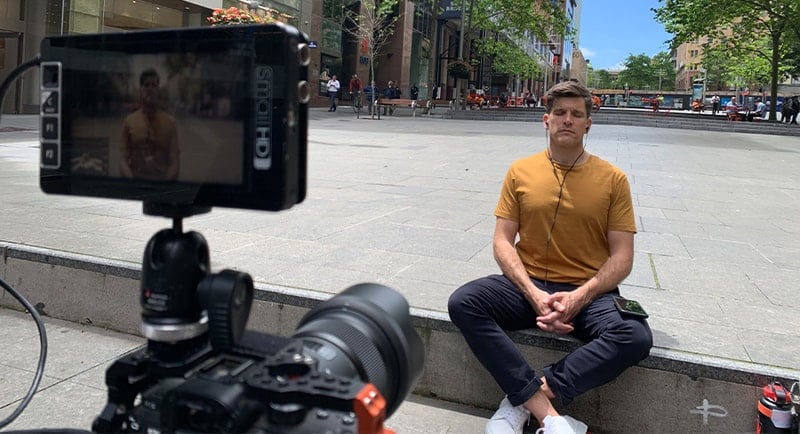Every day at least nine people in Australia die from suicide, and a further 179 people attempt to take their own life. That’s one person every eight minutes. Premiering on SBS at 8:30pm Sunday 19 September, the feature-length documentary Osher Günsberg: A Matter of Life and Death explores Australia’s suicide crisis and investigates how new science, innovative thinking and technology could help prevent suicide.
Mediaweek spoke to Osher Günsberg about making the documentary and opening up about his own experiences.
“I’ve been speaking about this kind of stuff on my podcast, not only by myself but with my guests, since 2013,” said Günsberg. “That led to going on stage and talking about it, being asked to speak about it at events and things like that, eventually writing a book about it and going on tour around the country and doing live shows based on that story. So the people who made this film knew that I was in this space and talking about this kind of thing quite publicly.”
The production company behind A Matter of Life and Death is Lune Media, a team that Günsberg holds in very high regard.
“We started about two years ago, they came and said hello, and asked about whether we can make this. I couldn’t be more grateful to work with this team, the team at Lune are the best documentary makers in the country. They made War On Waste, they made Fight For Planet A.
“You can’t really go bowling into someone’s home with a giant crew, moving stuff around and putting stands everywhere and then ask them ‘tell us about when this person that you really love had a very, very, very bad day and made an attempt’. It’s not like that. The entire team behind the film, and it’s quite a team, has done incredible work to get this up and on air.”
Australia’s Statistics
While mental health is becoming less and less of a taboo to speak about, the statistics of just how many people are impacted by suicide every day still takes people by surprise.
“I used to say if 63 people died every week from air travel they would shut every airport in the country until they figured it out. That would be it, no one’s flying anywhere. But we just let it carry on. The other thing is 179 people making an attempt every day, that is horrendous to understand that many people every single day are in so much pain that they are seeking a permanent solution to a temporary problem. Every one of those people has a friend, has a lover, a son, a daughter, a mum, a dad, an auntie, a cousin, a grandfather, a grandmother. Every single one of those people has someone worried.
“It’s not like we’re waiting for some magical thing to be invented, this film shows the interventions are there. We show in the film, it’s all there, we just need to have the political will to put these things into the medicare system and support people early on in their journey so that later on they don’t have to present acutely.”
Speaking Out
Throughout the documentary, Günsberg reflects on his own mental health experiences. While it may seem like a daunting task, he says that he’s never found it scary to speak out.
“It never was scary, because it’s not about me. I’m merely trying to speak to the person who is living with a mental illness that is trying to convince them they’re the only person in the world who feels like this and that it’s going to last forever. Because I know what it’s like. You know how they say the number one symptom of alcoholism is convincing yourself that you’re not an alcoholic? Well, I reckon one of the most powerful symptoms of mental illness is convincing yourself that you’re the only person that’s got it, and it’s going to last forever. I’m here to tell you, you’re not alone and that no mental state is a permanent state.
“All I’m trying to do when I talk on camera about this sort of thing is speak to the person who is where I was, and letting them know that you might be in a lot of pain right now, but I’m here to tell you it’s not going to last forever.”
Shooting through Covid
As with so many productions, A Matter of Life and Death was affected by the Covid-19 pandemic. For Günsberg and the team, getting through it was a matter of embracing the chaos.
“We shot this in November 2020. so we were in and out of masks, you’ll see it in the film.
“We did have to film under restrictions, but a big part of me getting better was acceptance. We just needed to accept there is an airborne virus that if we take it home could really make the people we love very, very, very sick or possibly kill them. How do we get around that? We can wear masks and we can stay a little bit apart from each other? Is that a problem? No? All right. That’s what life is like now, and that’s fine. Once you accept it, this is how it is. Move on. Get on with it. So that’s what we did.”
Hopes for the Film
Ultimately, Günsberg hopes that the documentary will have a positive impact for those who are dealing with mental illness.
“These people [at Lune] had a brilliant way of telling these really important stories in a way that was accessible to more than just nerdy policy wonks, and I think that’s really important. I really hope that yes, we’ve made a film that’s very accessible to everyone, but I really hope that people who are making healthcare policy decisions see this film and see the kinds of interventions that are available early on in someone’s mental health journey. If they were made available in the public health system it would prevent colossally impactful interventions later on. I really hope that’s one of the enduring legacies of this film.”
Osher Günsberg: A Matter of Life and Death premieres 8:30pm Sunday 19 September on SBS and SBS On Demand
Lifeline is available 24 hours a day, 7 days a week on 13 11 14 from anywhere in Australia

